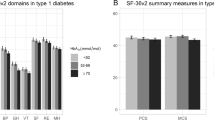Abstract
In order to implement the St Vincent Declaration programme, instruments for quality assurance of medical outcomes as well as measures of psychological outcomes of diabetes care had to be developed. This paper presents baseline values for three questionnaires measuring psychological Wellbeing, Treatment Statisfaction and General Health among a representative sample of adult people with diabetes in Sweden consisting of 423 individuals of which 153 were insulin treated and 270 were diet/tablet-treated.
Cronbach's α indicated that each of the Well-being and Treatment Satisfaction subscales was internally reliable, alphas ranging from 0.66–0.88. Factor analysis resulted in identification of five subscales (depression, anxiety, positive well-being, treatment satisfaction and metabolic control). There was no relation between any of the quality of life subscales with HbA1c, BMI, duration of diabetes, frequency of blood glucose tests per day, insulin regimens or diabetic complications. Females reported a more negative impact of diabetes on daily life compared with males (p<0.001). In conclusion, the Well-being and Treatment Satisfaction scales are reliable for quality assurance purposes in diabetes while the briefer general health instrument provides a useful assessment of the global impact of a chronic disease.
Similar content being viewed by others
References
Östman J, Larsson Y, Adamson U, Ericsson A, Nilsson B, Wredling R. Diabetesvården granskad i åtta län.Läkartidningen 1995;92: 1483–1486.
Pivernetz K, Home PD, Snorgaard O, Antsiferov M, Staehr-Johansen K, Krans M. Monitoring the targets of the St Vincent Declaration and the implementation of quality management in diabetes care: the DIABCARE initiative.Diabetic Med 1993;10: 371–377.
Braedly C.Handbook of psychology and diabetes. Hardcover: Harwood Academic Publishers, 1994.
Health in Sweden.Yearbook of Health Statistics 88/89. Statistics Sweden SCB 1988.
Cronbach LJ. Coefficient alpha and the internal structure of tests.Psychometrica 1951;16: 297–334.
Gåfvels C, Börjesson B, Lithner F. The social consequences of insulin-treated diabetes mellitus in patients 20–50 years of age. An epidemiological case-control study.Scand J Soc Med 1991;19: 86–93.
Eiser C, Flynn M, Green E, Havermans T, Kirby R, Sandeman D, Took JE. Quality of life in young adults with type 1 diabetes in relation to demographic and disease variables.Diabetic Med 1992;9: 375–378.
Hanestad BR. Self-reported quality of life and the effect of different clinical and demographic characteristics in people with type 1 diabetes.Diabetes Res Clin Prac 1993;19: 139–149.
Isacson D, Stålhammar J. Prescription drugs use among diabetics. A population study.J Chron Dis 1987;40: 651–660.
Bardsley MJ, Astell S, McCallum A, Home PD. The performance of three measures of health status in an outpatient diabetes population.Diabetic Med 1993;10: 619–626.
Author information
Authors and Affiliations
Rights and permissions
About this article
Cite this article
Wredling, R., Stålhammar, J., Adamson, U. et al. Well-being and treatment satisfaction in adults with diabetes: A Swedish population-based study. Qual Life Res 4, 515–522 (1995). https://doi.org/10.1007/BF00634746
Received:
Accepted:
Issue Date:
DOI: https://doi.org/10.1007/BF00634746




